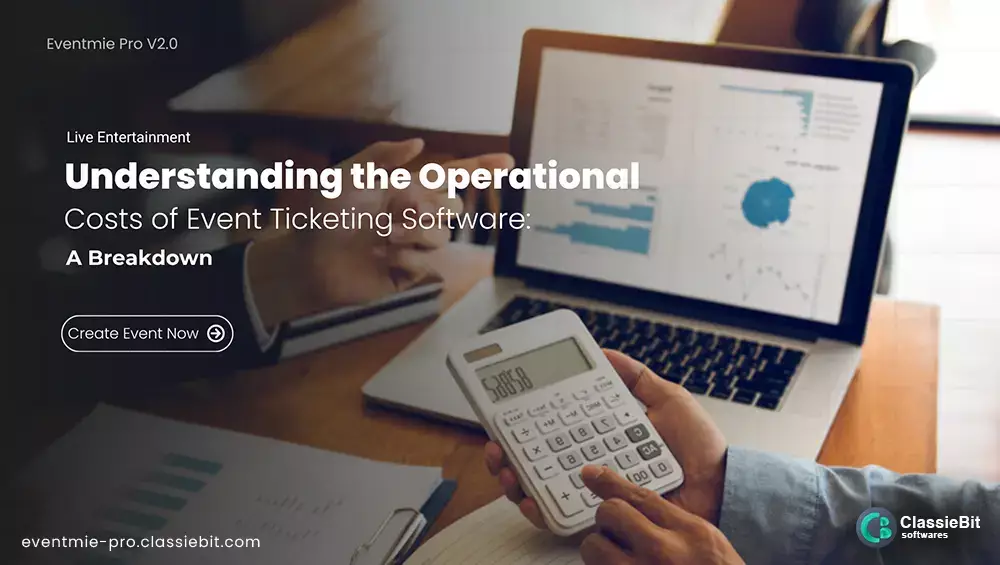
Understanding the Operational Costs of Event Ticketing Software: A Breakdown
Discover the true operational costs of event ticketing software with our comprehensive breakdown. Learn how to optimize your budget while maximizing efficiency and revenue generation.
Introduction:
Best event ticketing software in 2024 has revolutionized the way tickets are sold, managed, and distributed for various events, from concerts to sporting events and festivals. Behind the seamless user experience lies a complex web of operations, maintenance, server management, resourcing, and manpower, all of which contribute to the overall costs of running such platforms. In this blog, we'll delve into the various costs associated with the best event planning and management software, supported by concrete numbers and figures.
1. Operations Costs: Operations costs encompass a wide range of expenses required to keep the ticketing platform running smoothly. This includes software licensing fees, payment processing fees, customer support, and marketing expenses. Let's break down these costs:

- Software Licensing Fees: Depending on the scale and functionality of the ticketing software, licensing fees can range from a few thousand to millions of dollars annually. For instance, Ticketmaster's platform licensing fees can vary from $10,000 to $500,000 per year, depending on the package selected.
- Payment Processing Fees: Ticketing platforms often charge a percentage of each transaction as payment processing fees. This can range from 2% to 5% of the ticket price, depending on the payment gateway used and negotiated rates.
- Customer Support: Providing timely and efficient customer support is crucial for maintaining customer satisfaction. The costs associated with customer support include salaries for support staff, training, and infrastructure. On average, customer support costs can range from $20 to $50 per ticket sold.
- Marketing Expenses: To attract customers and promote events, ticketing platforms allocate a significant budget to marketing efforts. This can include digital advertising, email marketing, social media promotions, and partnerships with event organizers. Marketing expenses can vary greatly but typically range from 10% to 20% of total revenue.
2. Maintenance Costs: Maintenance costs involve keeping the ticketing software up-to-date, secure, and optimized for performance. These costs include software updates, server maintenance, security measures, and bug fixes. Here's a breakdown of maintenance costs:
.webp)
- Software Updates: Ticketing software requires regular updates to add new features, fix bugs, and ensure compatibility with evolving technologies. The cost of software updates can vary but is typically around 15% to 20% of the initial software licensing fee.
- Server Maintenance: Hosting the ticketing platform on reliable servers is essential for ensuring uptime and smooth performance. Server maintenance costs include server hosting fees, cloud service charges (if applicable), and IT infrastructure costs. These costs can range from $10,000 to $100,000 per year, depending on the size and complexity of the platform.
- Security Measures: Protecting customer data and preventing cyber-attacks are top priorities for ticketing platforms. Security measures such as encryption, firewalls, and regular security audits incur additional costs. On average, security expenses can account for 5% to 10% of total operational costs.
- Bug Fixes: Despite rigorous testing, bugs and technical issues are inevitable in software development. Allocating resources to address and fix these issues promptly is essential for maintaining the platform's reliability. Bug-fixing costs can vary but typically account for 5% to 10% of total maintenance expenses.
3. Server Costs: Ticketing software relies heavily on robust server infrastructure to handle high volumes of traffic, process transactions securely, and deliver a seamless user experience. Server costs include hardware expenses, bandwidth fees, data storage, and network infrastructure. Let's break down these costs:
.webp)
- Hardware Expenses: Investing in high-performance servers, routers, and networking equipment is essential for ensuring the scalability and reliability of the ticketing platform. Hardware expenses can range from $50,000 to $500,000 or more, depending on the infrastructure requirements.
- Bandwidth Fees: As ticketing platforms serve millions of users concurrently, bandwidth costs can be significant. Bandwidth fees depend on data transfer rates and usage volumes but typically range from $0.05 to $0.20 per gigabyte.
- Data Storage: Storing event data, customer information, and transaction records requires ample storage capacity. Data storage costs can vary depending on the amount of data generated and stored but typically range from $0.01 to $0.10 per gigabyte per month.
- Network Infrastructure: Building a reliable and secure network infrastructure involves investments in routers, switches, load balancers, and other networking components. Network infrastructure costs can vary depending on the complexity and scalability requirements of the platform.
4. Resourcing Costs: Resourcing costs encompass the expenses associated with hiring and managing the workforce required to develop, maintain, and support the ticketing software. These costs include salaries, benefits, training, and overhead expenses. Let's explore these costs:
.webp)
- Salaries: The salaries of software developers, engineers, QA testers, designers, and other technical professionals constitute a significant portion of resourcing costs. Salaries can vary depending on location, experience, and skill level but typically range from $60,000 to $150,000 per year.
- Benefits: Providing employee benefits such as health insurance, retirement plans, and paid time off adds to the overall resourcing costs. Benefits can account for an additional 20% to 30% of base salaries.
- Training: Continuous training and professional development are essential for keeping the workforce skilled and up-to-date with the latest technologies. Training expenses can vary but typically range from $1,000 to $5,000 per employee annually.
- Overhead Expenses: Overhead expenses such as office rent, utilities, equipment, and administrative costs contribute to the overall resourcing costs. Overhead expenses typically amount to 20% to 30% of total salaries and benefits.
Conclusion:
Running the best festival planning software in 2024 involves various operational, maintenance, server, resourcing, and manpower costs, all of which contribute to the overall expenses incurred by ticketing platforms like Ticketmaster. By understanding these costs and their associated figures, event organizers and ticketing platform operators can make informed decisions to optimize their operations, improve efficiency, and maximize profitability. If you want to purchase the best e-ticketing platform for hosting events, then choose Eventmie Pro Software, It has various advanced features & also a great feature like 0% commissions on ticket sales. We have also recently launched 2 new advanced event management products which you can check below links:
